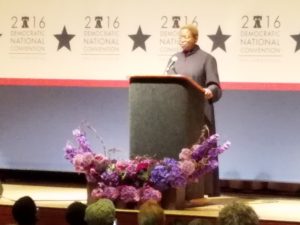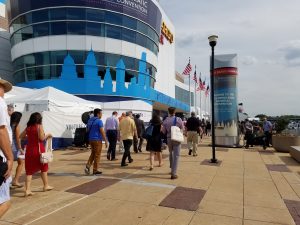Note: This press release is a sidebar to The DNC and the politics of accessibility
2016 Democratic National Convention Announces Plans to Make this the Most Accessible Convention Ever
Unprecedented Accessibility Plan Outlines Resources for People with Disabilities, Seniors and Individuals Who Need Specific Accommodations.
PHILADELPHIA – In the lead up to Convention week, the Democratic NationalConvention Committee (DNCC) today announced an unparalleled accessibility plan to make the Democratic Convention being held in Philadelphia from July 25th to July 28th the most inclusive and accessible in history. The DNCC’s Accessibility plan reaffirms the organization’s commitment to build upon the promise of the Americans with Disabilities Act (ADA) by removing barriers for all American’s with disabilities who wish to be involved in the Convention and engage in our nation’s political process.
“Our party has been at the helm of advancing the rights of people with disabilities for the last quarter century,” said DNCC CEO Rev. Leah Daughtry. “That is why our priority has been to make this a convention for all Americans, and we have worked tirelessly to ensure full equality for those with disabilities. As we celebrate the 26thanniversary of the Americans with Disabilities Act, we intend to make this Conventionthe most accessible convention in history.”
The DNCC has made accessibility an integral part of all aspects of Conventionplanning since its arrival in Philadelphia, from transportation and housing to designing the traffic flow at Convention events. In selecting official Convention venues, organizers chose sites that were ADA compliant and designed systems to accommodate all individuals including delegates and participants with specific needs. Last week, the DNCC also announced that Ted Jackson, a recognized leader in the disability rights community, was joining the organization to serve as a specialist in the Office of Public Engagement’s ADA & Community Engagement unit. Ted is helping create an accessible environment for people with disabilities and folks who need an accommodation at the 2016 Democratic National Convention.
Convention Accommodations for Disabled Individuals
The DNCC has partnered up with the Philadelphia Convention & Visitors Bureau (PHLCVB) and the Valley Forge Tourism & Convention Board (VFTCB) to help enhance the convention experience and ensure that delegates and participants have an array of options to meet their needs during Convention week. For months, the DNCC has been developing our Accessibility Plan, which is inclusive of people with disabilities, seniors and individuals who need a reasonable accommodation.
- Structural changes – e.g. ramps and seating – to the Convention center and Wells Fargo Center to ensure access for all.
- Mobility support in the form of wheelchair check out, scooter rental, power chair charging stations and sighted guides.
- Access to information by providing materials in alternate formats such as Braille, screen reader accessible electronic materials and large print.
- Inclusive communication by providing live captions, American Sign Language and Assisted Listening Devices at both facilities and Audio Descriptions forconvention hall proceedings plus an assistance request alert texting system.
- Disability Services at both locations which include individualized assistance plus:
- Personal Attendant Credentials (On Request In Advance)
- Optical Character Recognition Systems
- Guide Dog Relief
- Tactile Map
- Magnifiers
- Reading and Scribe Assistance
- ASL Interpreters
- Reachers
- Step Stools
- Medicine Refrigeration
- Masks for Chemical Sensitivity
- Non-Stimulation Space
- Ensuring all public facilities are accessible.
- The DNCC has secured hotel rooms and event spaces forconvention guests – delegates, the Democratic NationalCommittee (DNC), campaign staff, elected officials, allied groups and members of the media – in compliance with the ADA to ensure equal access opportunities, communication and mobility for all.
- Hotels are assigned to State Delegations based on the room block allocation for the Delegation, the function/caucus space needs, the number of suites and any ADA room requirements that are specific to each Delegation
- There are 27 hotels, and 15,000 hotel rooms in the Airport, River to River and Valley Forge clusters that have been exclusively set aside for our state delegations participating in the convention.
- Transportation: Daily transportation will be provided to the Wells Fargo Center and Pennsylvania Convention Center from all state delegation hotels. Each state delegation will receive ADA accommodations to ensure a safe and seamless shuttle service to and from convention-related proceedings, including Golf Cart transfers from the security entrance to the building entrance at the Wells Fargo Center.
- Employing people with disabilities to be engaged at all levels of accessibilityplanning.
###
About the Democratic National Convention
The 2016 Democratic Convention will be held at the Wells Fargo Center in Philadelphia July 25-28, 2016. Working in partnership with the Philadelphia Host Committee, the City of Philadelphia and the Commonwealth of Pennsylvania, our goal is to make this the most engaging, innovative and forward looking Convention in history. The 2016 Democratic National Convention will leverage technology to take the Convention experience well beyond the hall in an effort to engage more Americans than ever before in the event. With the birthplace of American Democracy as a backdrop, the 2016 convention in Philadelphia will highlight our shared Democratic values and help put the Democratic nominee on a path to victory.
The Democratic Convention is the formal nominating event for the Democratic candidates for President and Vice President. At the Convention, the Democratic Party also adopts the official Democratic Party platform as well as the rules and procedures governing party activities including the nomination process for presidential candidates in the next election cycle.
The CEO for the 2016 Democratic National Convention is Reverend Leah D. Daughtry. The official website of the 2016 Democratic National Convention is www.demconvention.com.

